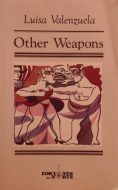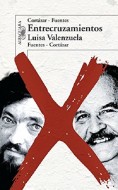Other Weapons (text in English)
Categories: Latin American Narrative
Courageous, without auto censura or outrageous extremes, cunning with her words, which can be extravagant when necessary, or deliciously refined and discreet where reality calls for it, Luisa Valenzuela is a woman deeply anchored in her condition; she is conscious of the still horrible discrimination in our continent, yet she is filled with a joy of life which enables her to surpass the first stages of protest and supervaluation of her sex, taking a legitimate place of equality with any writer in the world of letters. To read her is to enter fully into reality, and to participate in a search for a Latin American identity which continues to enrich itself. The books of Luisa Valenzuela are our present but they contain much of our future; there is real sun, real love, real liberty in each of her pages. (Julio Cortázar)
Other Weapon… and the name proclaims it with each of its letters, not so much in the whip which tears the back of the tortured woman, not so much in the pistol which is used as the definitive sign of the struggle, of the old contest where men and women look at each other with weapon in hand, waiting to deliver the coup de grace and decide on which side power is yielded. No, it’s not those weapons. The weapons are in this case in the expression of the face which searches desperately for a reflection, a voice which would sing —not the Muse’s song to the Lauras or the milenary Beatrixes. or even to the Devoured Woman, or to the Devouring Woman, who is the Whore, the Great Bitch whom the Melancholy Ruffian kicks around in Arlt’s books, or to the woman whom Junta Larsen places in the cat houses and phalansteries constructed by Onetti. No, the voice answers her own in echo, and wants to be, in unison, her Narcissus. (Margo Glantz)









